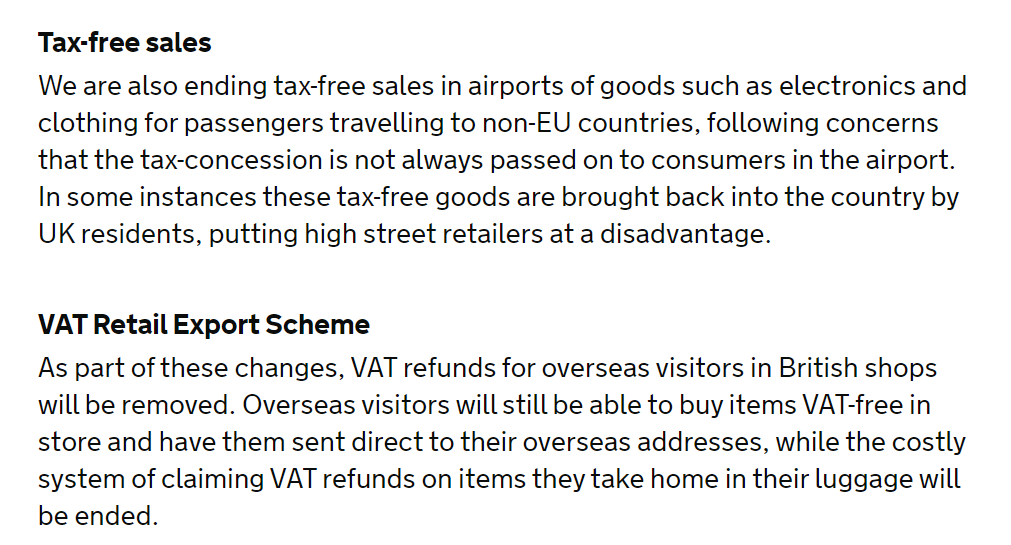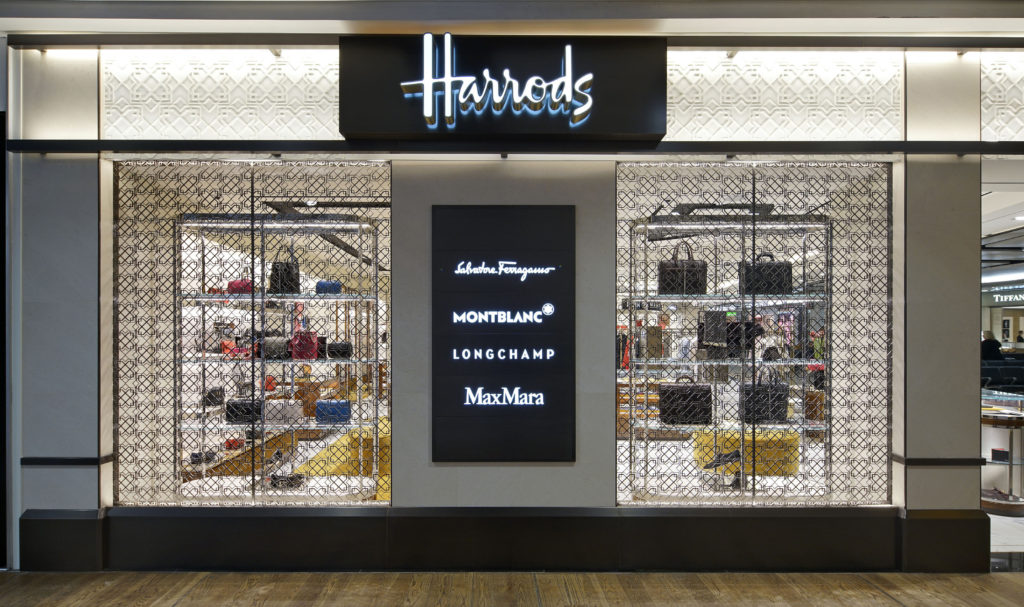
UK. Heathrow Airport, Dufry and Global Blue have lost their legal challenge to the UK Treasury’s controversial move to end tax free sales and VAT rebates for outbound tourists. Today judges at the High Court & Court of Appeal issued a ruling saying that “the challenges fail” on a number of legal grounds (see below).
The move, announced on 11 September, meant that tax free sales at UK airports were withdrawn for all outbound passengers from 1 January on goods other than liquor & tobacco. That includes the all-important fragrances & cosmetics category, as well as fashion, luxury, and consumer technology. The government decision, announced with no industry consultation, no impact assessment, and no warning, stunned the airport sector and its various stakeholders, together with other tourist-oriented businesses such as outlet malls and department stores.
London Heathrow Airport previously warned that the loss of tax free sales to international visitors would change its pricing proposition and put £200 million of annual revenues at risk.

The claimants took their case against the withdrawal of two schemes which provided exemptions from the duty to pay VAT on sales of products destined for export from the UK. The first was a statutory ‘VAT RES’ scheme, the other was called ‘ESC 9.1’ and was an extra-statutory concession made by the Commissioners of H.M. Customs and Excise, creating tax exemptions which differed depending upon whether sales were to the EU or to the rest of the world.
On a point of law, the claimants raised the issue of the constitutional power of the [Revenue] Commissioners in the matter. They also argued that the government had used the General Agreement on Tariffs and Trade (1964) to “artificially and wrongly constrain the range of possible solutions and ignored alternatives which were favourable, or at least less damaging”, to the claimants’ businesses.
They also said that the government did not factor in the new EU free trade agreement (Trade & Cooperation Agreement/TCA) into its calculations and disputed the approach taken by government to evaluating the economic consequences of the decision.

In a summary of their findings, Lord Justice Green and Mrs Justice Whipple “upheld the government’s view as to the limits upon the power of the Commissioners to use extra-statutory concessions to create exemptions from VAT.” The court agreed that the concessions “were outside of these powers and that if tax exemptions were to be retained or extended in the future this would have required legislation. The government did not therefore make any error in the analysis of the Commissioner’s powers,” they said.
The judges also upheld the government’s argument on GATT and added that the EU trade deal should not have entered the analysis, despite the claims from the industry partners.
The court said: “When the decision to abolish the tax exemptions was taken it was perfectly rational for the government not to take into account a free trade agreement that was not yet in force and which was still in negotiation and which might never come into being. It was equally a matter for the government not to decide to revisit its decision to abolish the tax schemes once the TCA was agreed and came into force.”
The court also rejected the claimants’ statements on the approach to evidence collection, saying that it was “justified and rational in the circumstances”.
The court concluded that “none of the [claimants’] grounds succeed and accordingly the appeal seeking permission to seek judicial review, the claim for judicial review and all associated applications, fail.”
Industry Reaction
In a statement, Dufry, Global Blue and Heathrow said: “The Treasury has baked-in a competitive disadvantage for UK tourism by making this the only country in Europe not to offer tax-free shopping. The previous policy had been hugely successful in attracting up to £4 billion of tourism spending in UK restaurants, theatres and shops each year and it is frustrating that whilst the Court recognised that the government’s consultation process was flawed, the government still chose to press ahead with this ill-considered decision.
“At a time when Ministers should be doing everything they can to help stimulate the country’s economic recovery, we would urge them to look again at all of the clear evidence which proves the revised policy is damaging for tens of thousands of jobs across the country.”

UK Travel Retail Forum Chair Francois Bourienne said: “When the government took the decision to remove tax free shopping last year, the UK Travel Retail Forum told the Exchequer Secretary that the impact on airside retailers would be profound. Only a few weeks ago Dixons announced the closure of all its airport shops up and down the country.
“There is no escaping the clear negative consequences stemming from a completely avoidable decision by Treasury. Airports will not be able to replace this lost revenue immediately, and will now find it harder to invest in infrastructure, route development, and the recovery from COVID-19.
“UKTRF continues to urge the government to reconsider its position to avoid causing further damage to UK businesses and UK livelihoods.”
Association of International Retail Chief Executive Paul Barnes said: “Today’s ruling is no surprise. It is always difficult to challenge the government’s decision-making process. But the case has forced the government to reveal the evidence upon which it based its decision and this is shocking, both in what it contains and what is missing.
“For example, included in the government’s evidence is a major consumer survey, commissioned by the government which undermines one of its key claims. In public statements the government has constantly said that tax-free shopping is not a major motivator for choosing to visit the UK and does not influence visitor spending behaviour. But its own research, revealed in court, shows exactly the opposite and that abolition of tax-free shopping will significantly reduce visitor numbers and spending, damaging the UK economy.
“And missing from the government’s evidence is any assessment of the likely fall in the £3 billion VAT collected annually from the £15 billion of non-tax-free sales in hotels, restaurants, shops and cultural venues as international visitors spend less time and less money in Britain. A fall of just 10% would wipe out all the £310 million the Treasury forecasts it will gain from imposing this new tourism tax when spending returns to 2019 levels. Any fall over 10% will lead to a net loss VAT.
“The Chancellor’s decision to make Britain the only European country not to offer tax-free shopping will result in up to 40,000 job losses across the UK and will hand over to France and Italy each year around £1.4 billion of tax-free sales that would have been made in Britain.
“These new revelations, and other issues raised in court, strengthen the call for an independent assessment of the full impact of this decision, as called for by the Chairman of the Treasury Select Committee.”

Global Blue UK Managing Director Derrick Hardman said: “We are disappointed with the court’s ruling and we highlighted many errors in the decision-making process which undermine the rationale for this policy decision.
“We, at Global Blue, strongly disapprove of this decision as we know it will deeply damage the attractiveness of UK tourism and shopping. Imposing a new retail tax of 20% to international tourists makes Britain the only European country to not offer tax free shopping, which weakens its competitiveness and drives valuable international tourist spending to other destinations, particularly France and Italy. Indeed, 90% of international shoppers who have previously shopped tax free in the UK claim that they will now choose to shop at an alternative European destination.
“We find it particularly astonishing that the government took this decision, considering its own HMRC survey of international travellers concluded that tax free shopping plays a strong role in attracting overseas visitors and that most visitors go on to spend all or some of their savings in the UK, with other sectors including hospitality and entertainment services also benefitting.
“We strongly support the call by the Treasury Select Committee for a full independent impact assessment of this new tax and will continue to campaign with all the stakeholders impacted by this new rule to reverse this decision.”
As reported, Heathrow has repeatedly called on the UK Chancellor to review the decision to abolish the VAT refund scheme and remove airside tax free shopping.
Commenting in its 2020 results announcement on 24 February, Heathrow said: “The existing tax-free status is a key purchase driver among passengers, particularly in high-spend categories such as luxury and technology. The VAT Refund scheme incentivises international residents to visit the UK and spend in the UK retail sector which benefits the wider economy and ‘UK PLC’. It is also a material source of revenue subsidising passenger charges.
“These changes will impact our pricing proposition materially and are therefore a significant and credible threat to our income of circa £200 million annually. Removing tax free shopping would lead to a c.15% increase in passenger charges from 2022, due to increased difficulty to remain price competitive versus foreign airports and destinations, as well as the knock-on impact of passengers using the VAT refund scheme at the airport.”
Global Blue research and analysis said that:
- 90% of international shoppers who have previously shopped tax free in the UK claim they will choose to shop at an alternative European destination
- The 20% price increase from this change will lead to a -40% decline of international shopper spend in the UK, with elasticity to price estimated at 2.0 based on historical data. This equates to a possible loss of £1.4 billion to local retailers
- UK retailers are also estimating an average of 35-40% decrease in sales from international shoppers
According to research by HMRC:
- Tax free shopping plays a role in attracting overseas visitors to the UK, especially for China and India and is a strong influence in the decision-making process to visit the UK
- Tax free shopping encourages tourists to spend more in the UK and accounts for more than half of spending amongst those who use it
- Around 36% would not have purchased all the goods they did if tax free shopping was not available.
- Most visitors go on to spend all or some of their savings in the UK, with a trickle down into hospitality and entertainment services, thus further boosting UK plc.












